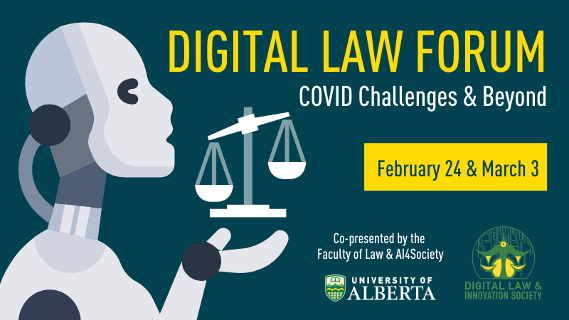Inaugural Digital Law Forum launches February 24 and March 3
Helen Metella - 11 February 2021

All lawyers now need a good understanding of technology to do their jobs well, says Hero Laird, a co-organizer of the upcoming Digital Law Forum at the University of Alberta.
“The Law Society of Alberta has recently added a duty of technological competence to its Code of Conduct,” says the second-year law student and part-time public servant with the government of Canada. “No matter what your subject area is, technology is involved now.
“To be a human rights lawyer, you might need to understand how surveillance works on smartphones. To be a family lawyer you might need to know how various technologies could impact custody arrangements. If a person played World of Warcraft and retains in-game assets, how might that affect loan repayment or disputes over a will? Technology isn’t just a specialty anymore.”
The notion need not be scary, Laird believes, because almost everyone is standing on the same starting line.
“The world has changed so fast that we’re all in it together now, whether you’re in your first year of law school or your 20th year of practice,” says Laird. “You don’t need to learn how to code, but you do need to know what the issues are and who you are going to call for help."
When and what
The Digital Law Forum will run two sessions per day on February 24 and March 3 in conjunction with the Digital Law and Innovation Society, a Faculty of Law student group, and AI4S (Artificial Intelligence For Society), a U of A signature area focused on AI and its applications.
Over the course of three lectures and one interactive discussion session, the forum’s speakers will acquaint both law students and lawyers with fundamental challenges of technology that should concern them. They will also introduce technology experts to some of the legal implications associated with their work.
Agenda
Session one, at noon on February 24, is called Liability for AI and will focus on what happens when AI goes wrong — who foots the bill and who takes the fall?
“If a self-driving car injures someone, who pays for the medical bills?” says Laird. “If AI is involved in making decisions and performing high-level functions we rely on for banking, email and language translations, what happens if something goes wrong?”
The presenter is Professor Argyri Panezi, a professor of law and technology from IE law school in Madrid, who "has dug deep into the effects of digital technology on laws, rights and responsibilities," says Laird.
Session two, at 5 p.m. on February 24, is on Artificial Intelligence, Administrative Law and Governance. Speaker Pia Andrews, an interdisciplinary data expert transforming public services around the world, will discuss how to prioritize human lives as more digital tools are used by public servants, lawyers and adjudicators in making decisions.
Session three, at 1 p.m. on March 3, will examine how digital change is playing out inside the Alberta government, both in changes to the process and changes in the types of cases that come before it. Jason Fung, counsel to the Alberta government, and Blair Neufeld, of the province’s Digital Innovation Office, are the presenters.
Session four, at 5 p.m. on March 3, is an interactive session that will give participants an opportunity to reflect on what has come up in the other sessions, discuss the special challenges and opportunities of AI and the law, and consider ideas and actions to explore next. Pia Andrews and Professor Péter Szigeti of the University of Alberta Faculty of Law will co-host this one-hour session, the only one that requires registration through Eventbrite.
“This is a chance to be part of a growing community in Alberta and beyond,” says Laird. “This is new for many of us, and it’s a chance to meet others grappling with the same issues.”
There is one Zoom link to the first three events on the agenda:
https://www.ualberta.ca/law/digitallawforum
For the last and interactive session on March 3, register at Eventbrite